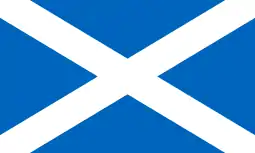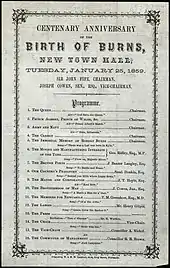Burns supper
A Burns supper is a celebration of the life and poetry of the poet Robert Burns (25 January 1759 – 21 July 1796), the author of many Scots poems. The suppers are normally held on or near the poet's birthday, 25 January, known as Burns Night (Scots: Burns Nicht; also called Robert Burns Day or Rabbie Burns Day). However, in principle, celebrations may be held at any other time of the year. Burns suppers are held all around the world.[1][2]
| Burns supper | |
|---|---|
 A traditional meal of haggis, neeps and tatties at Dundee Burns Club's 160th annual Burns supper. | |
| Observed by | Scotland; Scots people |
| Date | 25 January (traditional) |
| Frequency | Annual |
| Part of a series on the |
| Culture of Scotland |
|---|
 |
| History |
| People |
| Cuisine |
| Religion |
| Art |
| Literature |
|
History

The first supper was held in memoriam at Burns Cottage by Burns's friends, on 21 July 1801, the fifth anniversary of his death;[3] it has been a regular occurrence ever since. The first still extant Burns Club was founded in Greenock in 1801 by merchants who were born in Ayrshire, some of whom had known Burns. They held the first Burns supper on what they thought was his birthday, 29 January 1802, but in 1803, they discovered the Ayr parish records that noted his date of birth was actually 25 January 1759.[4] Since then, suppers have been held on or about 25 January.
The Scottish Parliament consider the celebration of Burns Night each year to be a key cultural heritage event.
The Parliament welcomes the annual celebration of Scotland’s national poet, Robert Burns, which is held on 25 January each year to mark the Bard’s birthday; considers that Burns was one of the greatest poets and that his work has influenced thinkers across the world; notes that Burns' first published collection, Poems Chiefly in the Scottish Dialect, also known as the "Kilmarnock Edition", published in 1786, did much to popularise and champion the Scots language, and considers that this is one of his most important legacies; believes that the celebration of Burns Night is an opportunity to raise awareness of the cultural significance of Scots and its status as one of the indigenous languages of Scotland, and further believes in the importance of the writing down of the Scots language to ensure its continuation through written documentation, as well as oral tradition.[5]

Burns suppers may be formal or informal. Both typically include haggis (a traditional Scottish dish celebrated by Burns in Address to a Haggis), Scotch whisky and the recitation of Burns's poetry. Formal dinners are hosted by organisations such as universities, sporting clubs, Burns clubs, the Freemasons or St Andrews Societies; they occasionally end with dancing or a ceilidh. During the global pandemic in 2021 Burns Night celebrations moved online and were popular amongst families eating at home.[6][7][8] Formal suppers follow a standard order.[9]
Standard order
Piping in guests
A bagpiper generally greets the guests, who gather and mix as at any informal party.[10] At less formal gatherings, traditional Scottish music is played.[11]
Host's welcoming speech
The host says a few words welcoming everyone to the supper and perhaps stating the reason for it.[10]
All the guests are seated and grace is said, usually using the Selkirk Grace, a well-known thanksgiving said before meals that uses the Scots language. Although attributed to Burns, the Selkirk Grace was already known in the 17th century as the "Galloway Grace" or the "Covenanters' Grace". It came to be called the Selkirk Grace because Burns was said to have delivered it at a dinner given by the Earl of Selkirk.
Selkirk Grace
- Some hae meat an canna eat,
- And some wad eat that want it;
- But we hae meat, and we can eat,
- And sae the Lord be thankit.[10]
Soup course

The supper starts with the soup course. Normally a Scottish soup, such as Scotch broth, potato soup, cullen skink, or cock-a-leekie, is served.
Piping in the haggis



Everyone stands as the haggis is brought in. Haggis is a meat dish[12] but in recent decades, a vegetarian alternative is often available.[13][14] It is usually brought in by the cook on a large dish, generally while a bagpiper leads the way to the host's table, where the haggis is laid down. "A Man's A Man for A' That", "Robbie Burns Medley" or "The Star O' Robbie Burns" might be played.[15] The host, or perhaps a guest, then recites the Address to a Haggis.
"Address to a Haggis"
.jpg.webp)
|
Fair fa' your honest, sonsie face, |
(fa = befall, sonsie = jolly/cheerful) |
|
The groaning trencher there ye fill, |
|
|
His knife see rustic Labour dicht, |
(dicht = wipe, here with the idea of sharpening) |
|
Then, horn for horn, they stretch an' strive: |
|
|
Is there that o're his French ragout |
|
|
Poor devil! see him ower his trash, |
|
|
But mark the Rustic, haggis fed, |
|
|
Ye Pow'rs wha mak mankind your care, |
|
At the line His knife see rustic Labour dicht, the speaker normally draws and sharpens a knife. At the line An' cut you up wi' ready slicht, he plunges it into the haggis and cuts it open from end to end. When done properly, the "ceremony" is a highlight of the evening.
Main course



At the end of the poem, a whisky toast will be proposed to the haggis, and the company will sit down to the meal. The haggis is traditionally served with mashed potatoes (tatties) and mashed swede turnip (neeps).[11]
Other courses
A dessert course, cheese courses, coffee, etc., may also be part of the meal. The courses normally use traditional Scottish recipes. For instance, dessert may be cranachan or tipsy laird (whisky trifle), followed by oatcakes and cheese, all washed down with the "water of life" (uisge beatha), Scotch whisky.
Toasts
When the meal reaches the coffee stage, various speeches and toasts are given.
Immortal memory
The main speaker gives a speech remembering some aspect of Burns's life or poetry. It may be either light-hearted or serious and may include the recitation of a poem or a song by Burns. A toast to the Immortal Memory of Robert Burns then follows.[11]
Address to the Lassies
This was originally a short speech given by a male guest in thanks to the women who had prepared the meal. However, it is now much more wide-ranging and generally covers the male speaker's view on women. It is normally amusing and not offensive, particularly since it will be followed by a reply from the "lassies" concerned. The men drink a toast to the women's health.
Reply to the Laddies
This is occasionally (and humorously) called the "Toast to the Laddies". Like the previous toast, it is generally now quite wide-ranging. A female guest will give her views on men and reply to any specific points raised by the previous speaker. Like the previous speech, it should be amusing but not offensive. Quite often, the speakers giving this toast and the previous one will collaborate so that the two toasts complement each other.
Works by Burns
After the speeches there may be singing of songs by Burns (such as "Ae Fond Kiss", "Parcel o' Rogues", and "A Man's a Man") and more poetry (such as "To a Mouse", "To a Louse", "Tam o' Shanter", "The Twa Dogs", and "Holy Willie's Prayer").
That may be done by the individual guests or by invited experts, and it goes on for as long as the guests wish. It may include other works by poets influenced by Burns, particularly poets writing in Scots. Foreign guests may also be invited to sing or say works from their land.
Closing
Finally, the host will call on one of the guests to give the vote of thanks. Then, everyone is asked to stand, join hands, and sing "Auld Lang Syne" to bring the evening to an end.
References
- "Interactive Map of Burns Suppers". www.burnsc21.glasgow.ac.uk. Retrieved 26 January 2021.
- "Global appeal of the Bard endures with 2,500 Burns Suppers plotted on world map". www.scotsman.com. Retrieved 26 January 2021.
- Scotland, National Trust for (26 January 2021). "The first Burns Supper". National Trust for Scotland. Retrieved 26 January 2021.
- "Congratulation Greenock Burns Club". The Robert Burns World Federation Limited. Archived from the original on 26 January 2010. Retrieved 18 January 2010.
- TV, Scottish Parliament, Celebrating Burns and the Scots Language, retrieved 26 January 2021
- "Burns Night goes virtual: 'It might be even bigger this year'". the Guardian. 24 January 2021. Retrieved 26 January 2021.
- "Nicola Sturgeon thanks virtual Burns supper organisers for allowing Scots to mark Burns Night in line with restrictions". www.scotsman.com. Retrieved 26 January 2021.
- "The best laid (online) schemes: Burns Night 2021 goes digital". HeraldScotland. Retrieved 26 January 2021.
- "BBC - Robert Burns - Burns Night - Running Order". www.bbc.co.uk. Retrieved 26 January 2021.
- "BBC - Robert Burns - Burns Night - Running Order". www.bbc.co.uk.
- "About: Celebrating Burns Night". VisitScotland. Retrieved 25 January 2019.
- "Haggis recipe". BBC Food. Retrieved 26 January 2021.
- "Vegetarian Haggis". BBC Good Food. Retrieved 26 January 2021.
- "How to cook the perfect vegetarian haggis". the Guardian. 22 January 2015. Retrieved 26 January 2021.
- Archie Cairns – Book 1 Pipe Music 1995
External links
| Wikimedia Commons has media related to Burns supper. |
| Look up Burns night in Wiktionary, the free dictionary. |
